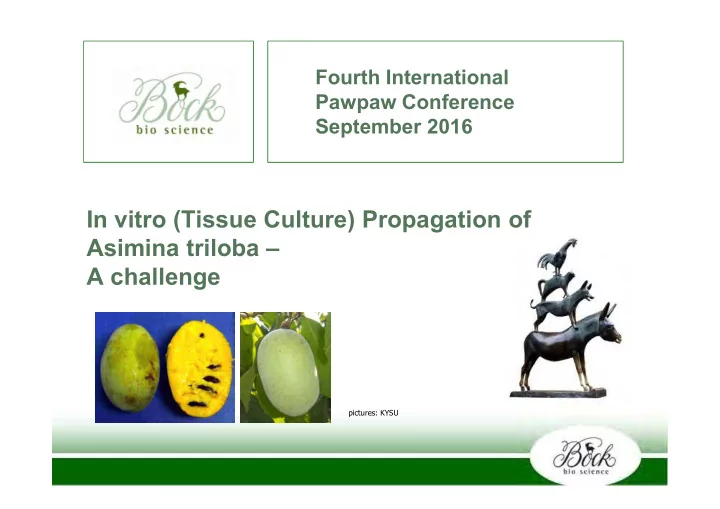

Fourth International Pawpaw Conference September 2016 In vitro (Tissue Culture) Propagation of Asimina triloba – A challenge pictures: KYSU
Bock Bio Science GmbH, Bremen
Core competences • Breeding • Tissue culture • Development of culture protocols • Industrial propagation of plants • R&D in Green biotechnology
Tissue culture – medium preparation and processing
Tissue culture - Growing
Meristem Propagation Meristem tissue from single selected plants is regenerated to whole plants and propagated exponantially in a sterile environment. Addition of different types and concentrations of plant hormones to the nutrition media induces growth, shoot and root development
Propagation of Asimina From seed: genetically heterogenous, yield and taste of fruits • often not satisfying, growth not uniform Cuttings: no rooting • Grafting: of valuable genotypes, rootstock: seedlings • � small quantity of available scions � losses � no defined rootstock clones � prices high � growth heterogenous demand exceeds supply
Tissue culture Steps: Parameter: C U 1. Part of plant, cutting technique Preparation • shoot meristems, root meristems, receptacle, leaves L T 2. Time of preparation Initiation • U 3. Sterilizing method axenic culture R Propagation • A 4. Nutrition media macro- / micronutrients, sugar, pH, gelling agent L Rooting • 5. Hormons concentrations, combinations P Adaptation • 6. Light R day length, intensity, quality (wavelength), O changes in light regime T 7. Temperature O changes in temperature Young plant C 8. Air humidity/ Ventilation O (9. horticultural measurements) L
Development of a culture protocol Given 10 options per parameter and free combinations of the 8 different parameters there would be 10 8 = 100 million ? different possibilities
Development of a culture protocol ? Given 10 options per parameter and free combinations of the 8 different parameters there would be ? 10 8 = 100 million ? ? different possibilities Dr. Maria Blondeau
Success Rates – Valuable Genotypes Preparation / Initiation 2013: 1.186 explants in total of 13 fruit varieties ( 148 mother plants) 2- 11 clean and vital explants each of 10 varieties no vital explant of 3 varieties 2014: Preparation of 3 fruit varieties: 161 explants no vital explant Preparation of 5 Peterson varieties, shoots of woody sticks supplied by KYSU no vital explant
Success Rates – Seedling Lines Preparation / Initiation 2013: sterilization and stratification treatment of seeds germination of 200 Asimina seeds 3 seeds steril and germinating propagation of 3 seedling lines 2014: preparation of young plants (seeds germinated in the green house) 1-2 clean and vital explants of each seedling Juvenility plays an important part concerning the success of the initiation step 10 seedling lines for experimental purposes
Success Rate Propagation (seedlings & clones) 10 out of 13 varieties are successfully established in our • laboratory 10 seedling lines are used for experimental purposes • test of more than 40(!) different media compositions for • initiation and propagation development of a nutrition medium, which ensures a very good • plant quality for a long period of subculture passages the propagation ratio is 1:2 to 1:4 • the subculture period is 6-8 weeks •
Success Rates Propagation 10 varieties successfully established: 1102 Mango 1103 Overleese 1105 Sunflower 1106 Prolific 1107 Taylor 1110 Mary Foos 1111 Rebecca‘s Gold 1112 Taytoo 1113 Belle 1108 NC-1 (endogenous bacteria) not successfull: Prima 1216 (Montanari) Davis Ithaca Sweet Alice
Success Rates Rooting Rooting of Asimina is very difficult… Many experiments showed ZERO success and proceedings only came very slowly by varying nearly each parameter Honestly, the initial enthusiasm was beginning to "melt" THEN – 1. September 2015A
Success Rates Rooting the rooting rate of fruit varieties was improved • up to a ratio of 40% 58 different compositions of medium – including multiple changes of • medium - were tested. the application of biogene amines improved the results • 8 different gelling agents and substrates were tested • physical parameters have to be changed during the process • seedling lines root better than fruit varieties • (juvenility).
Success Rates Rooting ratios 1102 Mango 36% 1103 Overleese 29% 1105 Sunflower 15% 1106 Prolific 12% 1107 Taylor 37% 1110 Mary Foos 11% 1111 Rebecca´s Gold 42% 1112 Taytoo 38% 1113 Belle 38%
Rooting Impressions
Adaptation conditions for adaptation process worked out unsolved problem: some plants stop growth, terminal bud goes dormant clone 1102 = variety „Mango“ Clone 1113 = variety „Belle“
Proof of Variety Genuineness (microsatellite genotyping)
Proof of Variety Genuineness (microsatellite genotyping)
Pedigree seedling S1 and S3 from lines one fruit Taylor Tatoo Fruit Mango varieties Rebecca Sunflower
Variety Genuineness and Pedigree no confusions within the fruit varieties • epigentic differences depending on origin / individuum • Seedlings and fruit varieties build subgroups • interesting for the search of molecular markers for fruit quality The difference among the seedlings is bigger than the • differences among the fruit varieties (graphic representation is slightly distorted)
Availability from spring 2017 onwards first trials of self rooted young plants varieties: Mango • Taylor • Rebecca‘s Gold • Taytoo • Belle • sterile microplugs
Thank you for your kind attention
Recommend
More recommend